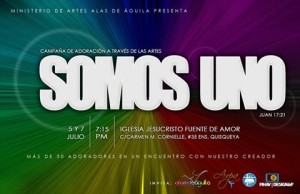EVANGELISTS IN CUBA BREAK WITH YEARS OF OLD TRADITION.
The Gospel in Cuba gives a giant step forward. The project ‘One’, the Church ‘Good Samaritan’, of Miami, brings together artists and believers of various nationalities in Havana.
An unusual concert filled the Teatro Mella. For the first time in many years there were only a show with the “word of mouth” as a mechanism to promote, without spot or interviews on television and the official press without disseminate it, he filled the room, as very few succeed.
A group of musicians from the United States, and received in Cuba by the Council of Churches of Cuba (CIC), surprised all attendees, believers or not, in a move that sets a new precedent in the modern history of the Cuban Church and also in how this is perceived by the general public.
The “One”, the “Good Samaritan” Church of Miami, brings together artists and believers of various nationalities, who put aside their differences in Cuba to show a new image of the church and religious worship.
The name of the initiative of the verse John 17:21, which records the last prayer of Jesus and asks human being “one”.
“We came to make the people is one (…) That verse touched us so much, because we are musicians from different parts that we were a nation. The fact that we put aside beliefs, myths, questions, questions, ideas, and Jesus did, let this concert. There was so precious moments where people said ‘wow, really something special, more than what you see’, “said in an exclusive interview to DDC Benhur (Associate Pastor).
“The goal is to find the way to teach the people we visited that Christian music is not boring. For many generations have lost the culture in the Church, either because the musicians were not well prepared or who directed the Church does not opened at certain things. If God deserves the best, why not pass it on Earth? (…) We are grateful for the opportunity to do it in Cuba, “said Benhur.
The band, consisting mostly Cuban-Americans, including singer, trombone, trumpet, saxophone, piano, minor percussion, drums, electric guitar and bass. The “One”, was able to show through a religious custom music and different way of communicating which in recent years has prevailed in the evangelical church in Cuba. During the concert merengue, bachata, timba, conga, and other genres were accomplices of praise.
“We were playing something, because we are the church, and we respect the pastors and leaders, but when you are transparent, or you have nothing to hide, people see the heart, people if there is something hidden sees it too ( …) No one can deny that he enjoyed. Today was demonstrated that our rhythms can be used to glorify the Lord. ”
Benhur, as a master of ceremonies, led the musical moment with charisma and transparency after that two hours will fly; didactic, jovial, something refreshing and new to the Cuban evangelical preaching worship.
However, some attendees estranged more spontaneity in the organization and conception, by the Council of Churches, which could have included a call for more musicians in Cuba.
The concert “One”, which has already been done in countries such as Mexico and the Dominican Republic was free. The musicians and pastors could reach the island thanks to the contributions of various churches and people of Miami. The restoration of diplomatic relations between Cuba and the United States and the work of the Council of Churches of Cuba made possible the trip and presentation on the island.
The quality of the musical arrangements, the virtuosity of the musicians, the “bomb” as they say in good Cuban, with which these issues are interpreted, demonstrated that music is everywhere, whether it is Yoruba, evangelical or Islamic ; English, Spanish or Russian. It is a universal language that unites us all.
Agencies / DDC / InternetPhotos / Excerpts / TheCubanHistory.com
The Cuban History, Hollywood.
Arnoldo Varona, Editor.
EVANGELISTAS EN CUBA ROMPEN CON MUCHOS AÑOS DE VIEJA TRADICIÓN.
El Evangelio en Cuba da un paso gigantesco hacia el futuro. El proyecto ‘Uno’, de la Iglesia ‘El Buen Samaritano’, de Miami, reúne a artistas y creyentes de varias nacionalidades en La Habana.
Un concierto atípico llenó el Teatro Mella. Por primera vez en muchos años un espectáculo que contaba solo con el “boca a boca” como mecanismo de promoción, sin spot ni entrevistas en la televisión y sin que la prensa oficialista lo difundiera, repletó la sala, como muy pocos lo logran.
Un grupo de músicos procedentes de Estados Unidos, y recibidos en Cuba por el Consejo de Iglesias de Cuba (CIC), sorprendió a todos los asistentes, creyentes o no, en una iniciativa que sienta un nuevo precedente en la historia contemporánea de la Iglesia cubana y también en la forma en que esta es percibida por la población en general.
El proyecto “Uno”, de la Iglesia “El Buen Samaritano”, de Miami, reúne a artistas y creyentes de varias nacionalidades, que pusieron a un lado sus diferencias para mostrar en Cuba una nueva imagen de la Iglesia y el culto religioso.
El nombre de la iniciativa parte del verso Juan 17.21, que registra la última oración de Jesús y pide a los humanos ser “uno”.
“Vinimos a hacer que el pueblo sea uno (…) Ese verso nos tocó tanto, pues somos músicos de distintas partes, que veníamos a una nación. El hecho de que pusiéramos a un lado creencias, mitos, preguntas, cuestionamientos, ideas, como hizo Jesús, permitió este concierto. Hubo momentos tan preciosos, donde la gente dijo ‘wao, de verdad que hay algo especial, mayor a lo que uno ve'”, explicó en entrevista exclusiva a DDC Benhur (Pastor Asociado).
“El objetivo es buscar la vía para enseñarle al pueblo que visitamos que la música cristiana no es aburrida. Por muchas generaciones hemos perdido la cultura que hay en la Iglesia, ya sea porque los músicos no estaban bien preparados o quienes dirigían la Iglesia no se abrían a ciertas cosas. Si Dios merece lo mejor, ¿por qué no dárselo en la Tierra? (…) Estamos muy agradecidos por la oportunidad de hacerlo en Cuba”, añadió Benhur.
La banda, en su mayoría integrada por cubanoamericanos, incluye cantante, trombón, trompeta, saxofón, piano, percusión menor, batería, guitarra eléctrica y bajo. El proyecto “Uno”, logró mostrar a través de la música una costumbre religiosa y forma de comunicar diferentes a la que en los últimos años ha imperado en la iglesia evangélica en Cuba. Durante el concierto merengue, bachata, timba, conga, y otros géneros fueron cómplices de la alabanza.
“Nos estábamos jugando algo, porque somos de las iglesias, y respetamos a los pastores y a los líderes, pero cuando tú eres transparente, o no tienes nada que esconder, la gente ve el corazón, si hay algo escondido la gente lo ve también (…) Nadie puede negar que disfrutó. Hoy quedó demostrado que se pueden utilizar nuestros ritmos para glorificar al Señor”.
Benhur, como todo un maestro de ceremonia, condujo el momento musical con carisma y transparencia logrando que dos horas pasaran volando; con prédicas didácticas, joviales, algo refrescantes y nuevas para el culto evangélico cubano.
Sin embargo, algunos asistentes extrañaron más espontaneidad en la organización y concepción, a cargo el Consejo de Iglesias, que pudiera haber incluido una convocatoria a más músicos dentro de la Isla.
El Concierto “Uno”, que ya se ha realizado en países como México y República Dominicana, fue totalmente gratis. Los músicos y pastores pudieron llegar a la Isla gracias a las contribuciones de diversas iglesias y habitantes de Miami. El restablecimiento de las relaciones diplomáticas entre Cuba y Estados Unidos y la labor que realiza el Consejo de Iglesias de Cuba posibilitó el viaje y la presentación en la Isla.
La calidad de los arreglos musicales, el virtuosismo de los instrumentistas, la “bomba” como se dice en buen cubano, con la que se interpretaron estos temas, demostraron que la música está en todas partes, no importa si es yoruba, evangélica o islámica; en inglés, en español o en ruso. Es un lenguaje universal que nos une a todos.
Agencies/DDC/InternetPhotos/Excerpts/TheCubanHistory.com
The Cuban History, Hollywood.
Arnoldo Varona, Editor.



 EVANGELISTS IN CUBA Break with Years of Old Tradition. + EVANGELISTAS EN CUBA Rompen con Muchos Años de Vieja Tradición.
EVANGELISTS IN CUBA Break with Years of Old Tradition. + EVANGELISTAS EN CUBA Rompen con Muchos Años de Vieja Tradición.


